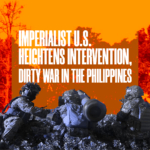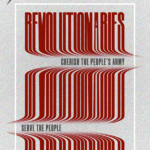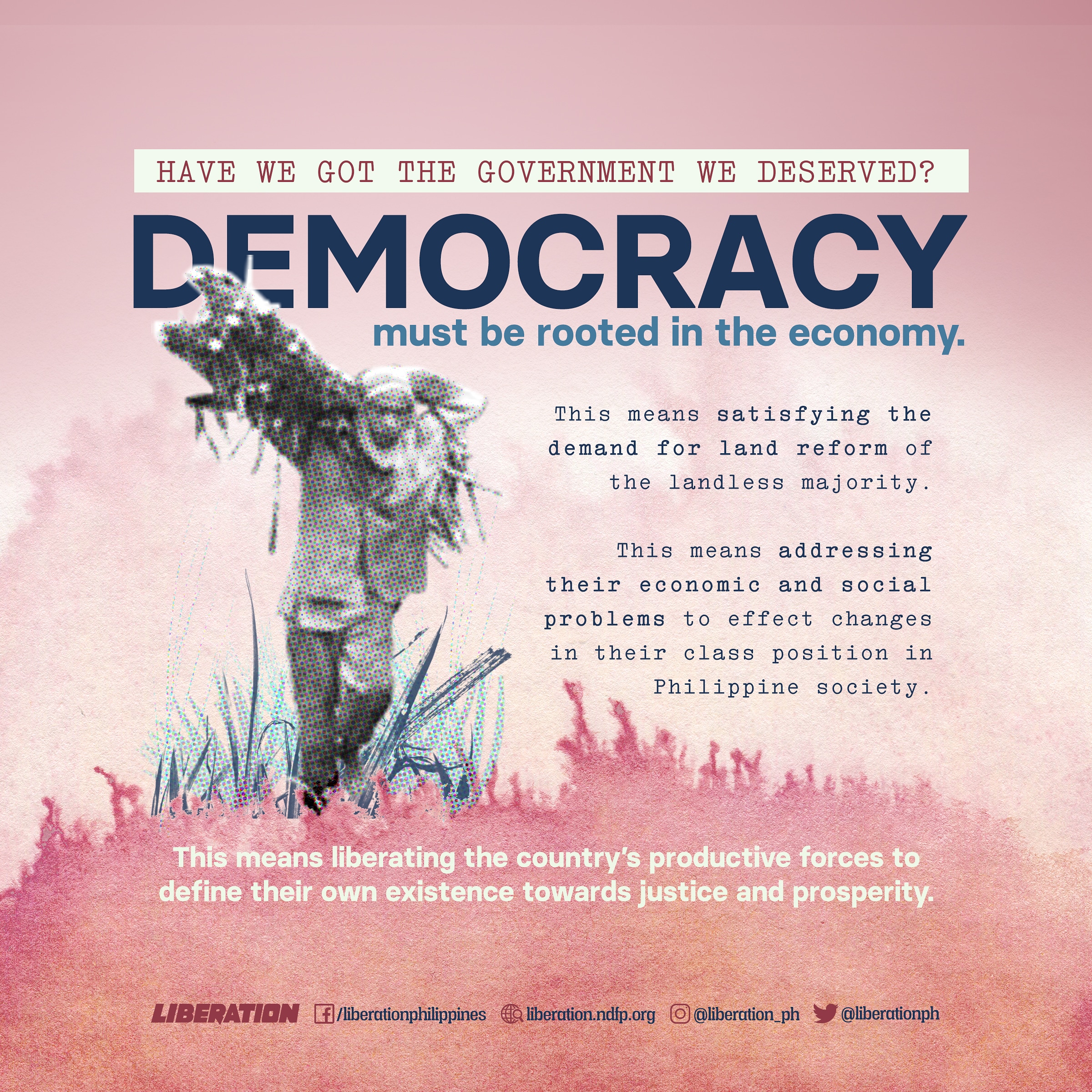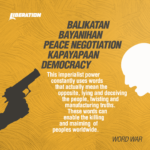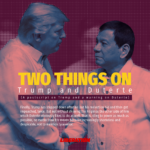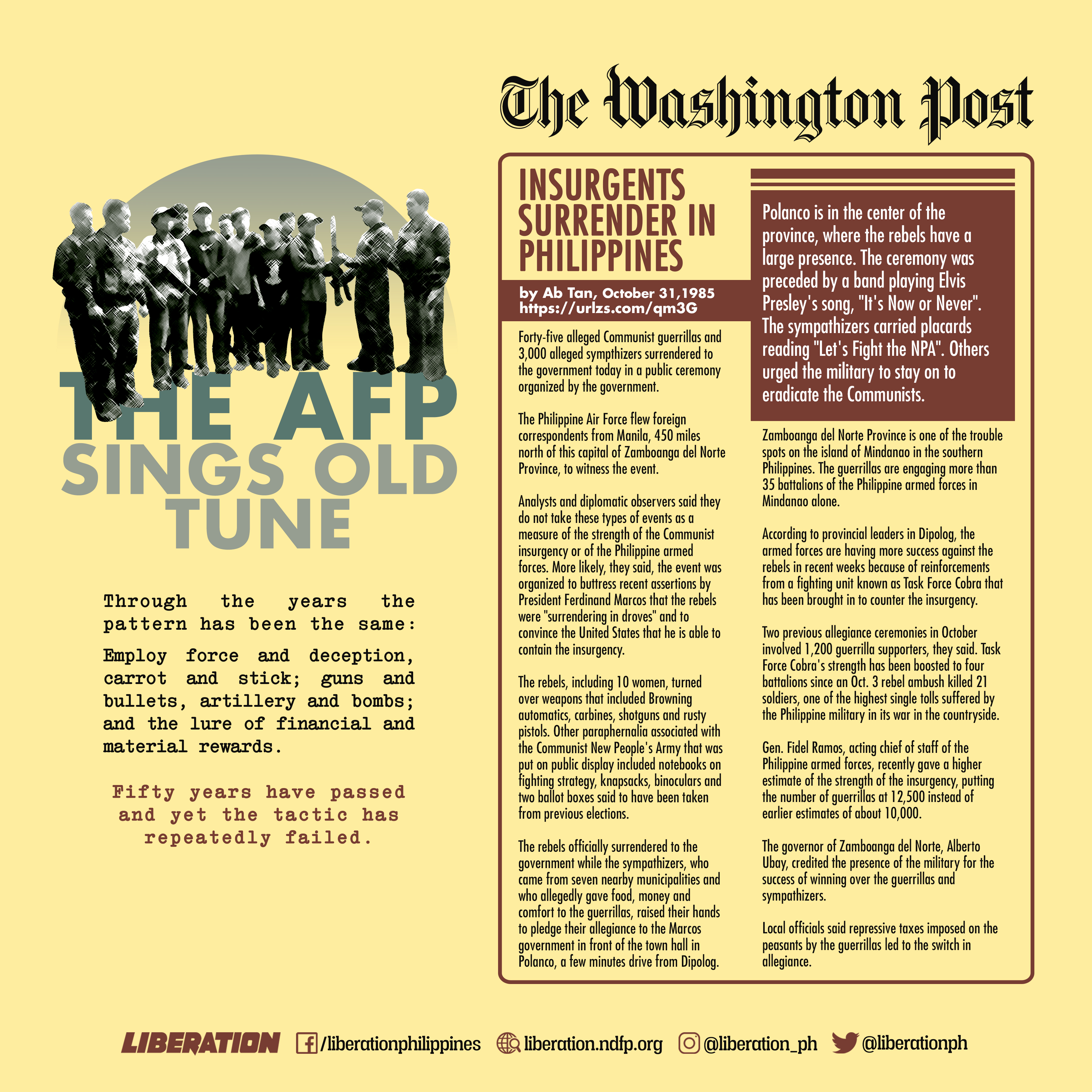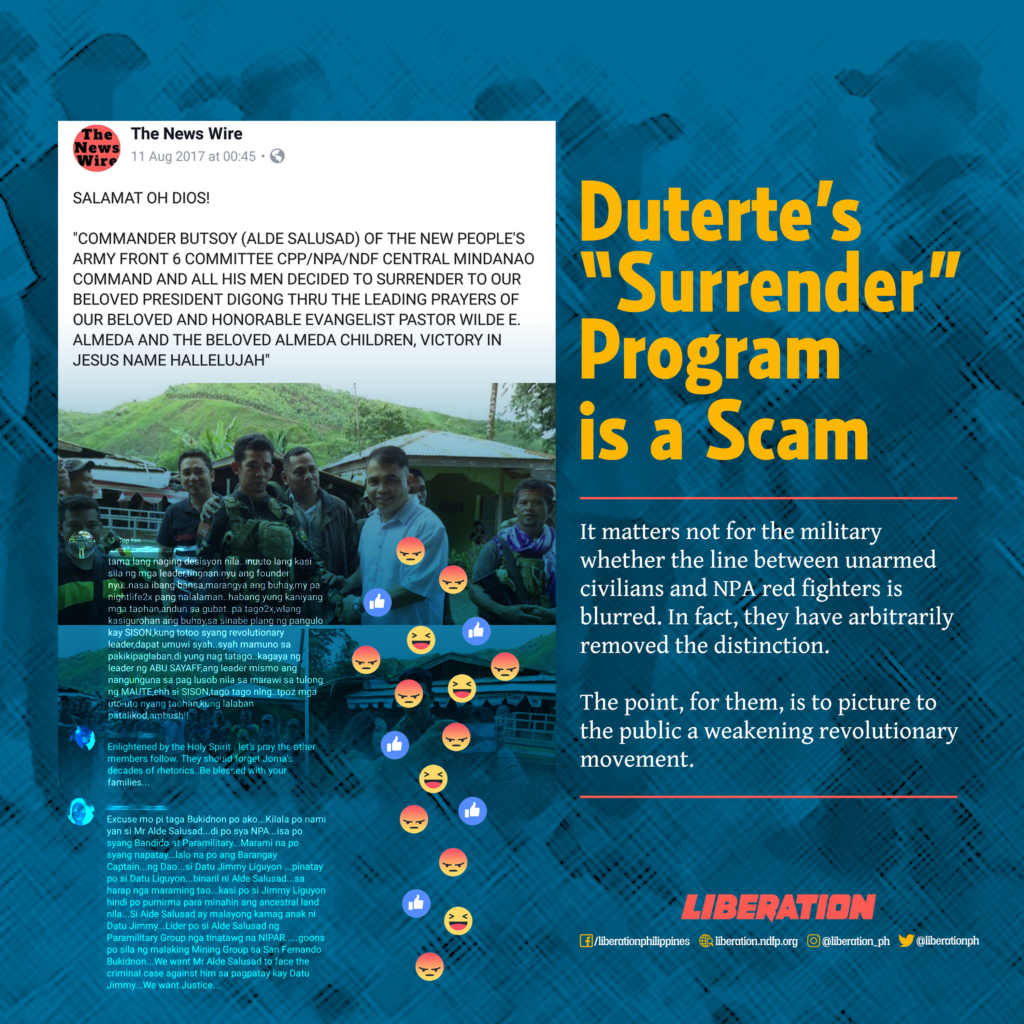RISE UP FOR COUNTRY AND DISSENT (Pt. 2 of 2)

by Pat Gambao
Dissent in the military
The debased culture and unscrupulous practices in the military institution of the reactionary government have caused demoralization and dissent among its constituents. These have awakened their consciousness and revitalized their ideals.
Political patronage, an abomination passed on to the Filipinos by our Spanish and American colonizers, is an enduring feature of the AFP and PNP. The breaking away of then Defense Secretary Juan Ponce Enrile and Constabulary Chief Fidel Ramos from the DND-AFP command was in resentment of the favor and privileges accorded to General Fabian Ver by Pres. Marcos. The fray ignited the 1986 EDSA People Power Uprising.
The defection of bemedalled Brig. General Raymundo Jarque, the highest-ranking AFP officer who joined the New People’s Army (NPA), was in extreme disgust of the corruption in the military and then President Ramos’s accommodation of his allies. Jarque displeased the well-connected Pena family in Negros over a land dispute. This put him in a bad light as the court favoured Pena and turned the table on Jarque who was falsely charged with stealing prawns from Pena’s farm and ambushing the judge.
Amidst the struggling masses, Jarque realized that his greatest mistake was to have rendered service to the greedy and powerful who exploits and oppresses the poor. Having led the implementation of the bloody Oplan Thunderbolt in Negros in 1989-1990, he manifested his sincere repentance by going to the people, crying as he asked for forgiveness. Weeks after Jarque’s defection, a number of CAFGU (Civilian Armed Force Geographical Unit) members from Northern Negros fled with their weapons and joined the NPA.
Corruption is deeply entrenched in the reactionary ruling system. It is endemic and at its worst in the military establishment because of the latter’s authoritarian nature and armed supremacy. Corruption in the military is manifested in the procurement process, in bribes extracted from foreign and local business and industrial corporations, through involvement in smuggling, in illegal drugs, and in the sale of arms and military materials to rebel groups.
Juggling and malversation of funds is just as common. Corruption plagues the top hierarchy of the institution and any dissent or exposé from below is met with drastic if not fatal repercussion.
Young Philippine Navy Ensign Philip Pestaño was found dead with a single bullet wound in the head inside his cabin after he discovered the loading of logs and drugs in the navy ship. Navy officials dismissed the case as suicide although autopsy results showed otherwise.
Lt. Jessica Chavez, platoon leader of the 191st Military Police Battalion stationed in Fort Bonifacio, was being used by her superiors in gunrunning and other criminal activities. She had planned to expose the corruption before leaving the service but she was summarily killed before she could do so. Again, the AFP declared her death as suicide.
The Oakwood mutiny in 2003 by 300 soldiers from the Philippine Army, Navy and Air Force, including 70 junior officers, was an expression of their grievance and dissent over the gross corruption in the military and the fascist regime of Gloria Macapagal-Arroyo, which she wanted to perpetuate. The mutineers declared withdrawal of support from the chain of command and demanded Arroyo’s resignation.
However, because it lacked strong support from a people’s movement as the mutineers relied on spent politicians, the Oakwood mutiny, as well as the succeeding Peninsula Siege, quickly dissipated.
The brazen corruption is incessant and sickening. Imagine allocating PhP50 million from AFP funds as send-off gifts to retiring generals, over and above their legal retirement pay. Imagine the PNP police director for comptrollership being questioned by Russian customs office for carrying excessive amount of cash (105,000 Euros or PhP6.9 million). The general was with an 8-member PNP delegation that attended the International Police (Interpol) Assembly in St. Petersburg in Moscow in 2008.
The most contemptuous scam committed by the military top brass was the diversion of the funds of the AFP Retirement and Separation Benefits System (AFP-RSBS) for their vested interest. The funds came from the compulsory collection of five percent of every soldier’s monthly salary. The government continued to pay the pension and separation benefits of soldiers.
Meantime, the RSBS funds and proceeds from its investments were pocketed by the AFP officials. Although most investments incurred losses, the officers still benefited from brokering the deals and from substantial allowances they received, charged to the funds.
The Mamasapano incident in Maguindanao, on January 25, 2015, claimed the lives of 44 members of the PNP’s elite Special Action Force (SAF). Without notifying or coordinating with the Moro Islamic Liberation Front (MILF), the SAF conducted Operation Exodus against a US-tagged “terrorist” adversary, the Malaysian bomb-maker Marwan or Zulkifli Abhir, (also known as Abdul Basit Ulman). Marwan was killed, but the MILF and Bangsamoro Islamic Freedom Fighter (BIFF) bivouacked in the area were alerted by the firefight. They ambushed the SAF members as they were withdrawing, resulting in the latter’s massacre.
Operation Exodus was a joint operation with the US Army. However, the SAF was left alone in the implementation, while US authorities and Filipino political leaders and generals monitored the incident from afar through telecast.
It was utterly bad that for the protection of foreign (US) interest and the local ruling class the lives of members of an expensively-trained elite police force were unnecessarily sacrificed. The Mamasapano incident was no different from how soldiers are sent to senseless violent battles and pitted against their own class.
This is a wakeup call for the military minions of the ruling class. ##
RISE UP FOR COUNTRY AND PEOPLE (Pt. 1 of 2)
Revolution strikes chords in the state military
#ServeThePeople
#CherishThePeoplesArmy
—–
VISIT and FOLLOW
Website: https://liberation.ndfp.info
Twitter: https://twitter.com/liberationph
Instagram: https://instagram.com/liberation_ph



